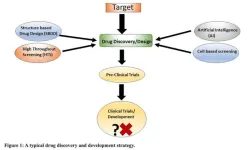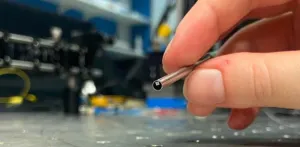The fate of drug discovery in academia; dumping in the publication landfill?
2024-02-05
(Press-News.org)
“[...] fruitful efforts to bring more drugs from bench to bedside could only be possible if we do not leave them ‘midway’!”
BUFFALO, NY- February 5, 2024 – A new editorial paper was published in Oncotarget's Volume 15 on January 24, 2024, entitled, “The fate of drug discovery in academia; dumping in the publication landfill?”
In this new editorial, researchers Uzma Saqib, Isaac S. Demaree, Alexander G. Obukhov, Mirza S. Baig, Amiram Ariel, and Krishnan Hajela, from Devi Ahilya Vishwavidyalaya, Indore, discuss drug discovery—a tedious process that is time consuming in both divulging whether a molecule is efficacious and specific in hitting the target and also in confirming that the potential drug does not cause severe adverse effects. Many drug candidates fail crossing multiple checkpoints of this long journey; they lag in one or several aspects and never move beyond the research bench to contribute to public health. These setbacks make the process of drug discovery very time consuming, expensive, and tedious.
“This viewpoint is focused on delineating how and why the multi-million [dollar] research efforts in the field of drug discovery often fail to reach its full potential.”
There is no shortage of studies focusing on drug discovery. They are published on a daily basis describing the efforts encompassing conventional and/or modern drug discovery technology, including structure-based drug design (SBDD), virtual screening, high-throughput screening (HTS), Artificial Intelligence (AI), and cell-based screening approaches (Figure 1). However, many drug development strategies are rather fuzzy in their advancement.
Thus, there is a large gap between drug “discovery” and “development.” This part could be attributed to the lack of synergy between Academia and Industry at multiple levels. A significant part of this failure results from the lack of streamlining of drug development process.
“In the current perspective, we discussed why many therapeutic molecules never make it to clinical studies despite being proven efficacious pre-clinically. Additionally, we discussed the possible solutions to overcome this défaut of the drug development process.”
Read the full paper: DOI: https://doi.org/10.18632/oncotarget.28552
Correspondence to: Krishnan Hajela
Email: hajelak@gmail.com
Keywords: drug discovery and development, clinical trials, academia-industry collaboration, translational research, drug database
Click here to sign up for free Altmetric alerts about this article.
About Oncotarget: Oncotarget (a primarily oncology-focused, peer-reviewed, open access journal) aims to maximize research impact through insightful peer-review; eliminate borders between specialties by linking different fields of oncology, cancer research and biomedical sciences; and foster application of basic and clinical science.
To learn more about Oncotarget, visit Oncotarget.com and connect with us on social media:
X, formerly Twitter
Facebook
YouTube
Instagram
LinkedIn
Pinterest
Reddit
Spotify, and available wherever you listen to podcasts
Click here to subscribe to Oncotarget publication updates.
For media inquiries, please contact media@impactjournals.com.
Oncotarget Journal Office
6666 East Quaker Street., Suite 1A
Orchard Park, NY 14127
Phone: 1-800-922-0957 (option 2)
###
END
[Attachments] See images for this press release:

ELSE PRESS RELEASES FROM THIS DATE:
2024-02-05
In a warming climate, meltwater from Antarctica is expected to contribute significantly to rising seas. For the most part, though, research has been focused on West Antarctica, in places like the Thwaites Glacier, which has seen significant melt in recent decades.
In a paper published Jan. 19 in Geophysical Research Letters, researchers at Stanford have shown that the Wilkes Subglacial Basin in East Antarctica, which holds enough ice to raise global sea levels by more than 10 feet, could be closer to runaway melting than anyone realized.
“There hasn’t been much analysis in this region – there’s huge ...
2024-02-05
Gastrointestinal cancers (GCs) are among the most common forms of cancer and account for as much as one-third of all cancer deaths worldwide. Early diagnosis is an effective way of reducing the mortality associated with GCs, and endoscopic screening has proved to be an excellent approach for detecting potentially malignant tumors.
To extend the benefits of screening programs to as many people as possible, the imaging systems used should be inexpensive to manufacture and operate, yet accurate enough ...
2024-02-05
Bariatric surgery is more effective in controlling hypertension rates, or high blood pressure, in people with obesity and uncontrolled high blood pressure compared to blood pressure medication alone, according to a study published today in the Journal of the American College of Cardiology. People who underwent bariatric surgery had lower BMI and were on fewer medications after five years while maintaining normal blood pressure levels than those who only used antihypertensive medications.
According to the CDC, the U.S. obesity and hypertension rates in adults are 41.9% and 45.4%, respectively. Obesity is a known ...
2024-02-05
Numerous studies have raised alarms about how the COVID-19 pandemic disrupted learning, development and mental health among school-aged children. But few have focused on the effects felt by the 22 million children under age 6 who were not yet in school.
Now a study published Feb. 5, 2024, in JAMA Pediatrics, led by researchers at Cincinnati Children’s in collaboration with the Cincinnati Public Schools, documents the pandemic’s harmful effects on kindergarten readiness. The findings are based on data from about 8,000 kindergartners who took ...
2024-02-05
MSU has a satellite uplink/LTN TV studio and Comrex line for radio interviews upon request.
EAST LANSING, Mich. – As artificial intelligence technology advances, one area lags behind: voice-activated AI. For the more than 80 million people who stutter, voice AI technologies, which are increasingly being used in job hiring practices, can still be impossible to navigate.
HeardAI, a multidisciplinary project from Michigan State University, Western Michigan University, and the nonprofit Friends: The National Association of Young People Who Stutter, has advanced to Phase 2 of the National Science Foundation’s Convergence Accelerator program to ...
2024-02-05
Lowder & Foudray Receive Funding For Fairfax County Peer Recovery Services Evaluability Assessment
Evan Marie Lowder, Assistant Professor, Criminology, Law and Society, and Chelsea Foudray, Postdoctoral Research Fellow, Criminology, Law and Society, received funding from County of Fairfax for: "Fairfax County Peer Recovery Services Evaluability Assessment."
Lowder and Foudray are laying the groundwork for a formal evaluation of Fairfax County Peer Recovery Services (PRS) programming.
For ...
2024-02-05
This work was adapted from articles by Elizabeth Boatman and Emily C. Dooley.
Research from Lawrence Berkeley National Laboratory (Berkeley Lab), Lawrence Livermore National Laboratory (LLNL), and UC Davis sheds new light on how to access the sugars locked up in plants to produce petroleum-free fuels, chemicals, and medicines.
Using microbes to convert grasses, weeds, wood, and other plant residues into sustainable products will be key to achieving carbon neutrality and could even help eliminate drug shortages. But cellulose, the tough tissue that makes up a large proportion of herbaceous and woody plant ...
2024-02-05
Lin X. Chen, a chemist at the U.S. Department of Energy’s Argonne National Laboratory, has received the Senior Prize as part of the two 2023 Mildred Dresselhaus Guest Professorship Awards from the University of Hamburg, Germany. The award recognizes outstanding international women scientists and offers an opportunity for awardees to conduct research at the Hamburg Centre for Ultrafast Imaging Cluster of Excellence. Chen has held a joint appointment as professor of chemistry at Northwestern University since 2007.
“I am very honored ...
2024-02-05
Hart Receives Funding For Boot Camp
David M. Hart, Professor, Schar School of Policy and Government, received funding for: "2024 Climate-Tech Innovation Policy 'Boot Camp' for Early Career Researchers."
Via this effort, Hart will build interpersonal bridges across the gap that separates the policy and research communities, sensitize researchers to the practical considerations that shape energy and climate innovation policy, and create new inter-disciplinary linkages among early-career researchers.
His long-term objective is to shape the research agendas of the participating scholars, so that they contribute as fully as ...
2024-02-05
The Max Planck Institute for Informatics and Google deepen their strategic research partnership. With additional financial support from the U.S. IT company, the “Saarbrücken Research Center for Visual Computing, Interaction and Artificial Intelligence (VIA)”, which was only launched in November 2022 at the MPI in Saarbrücken, is establishing a new research area “Vision and Language Models (VLMs)”, led by Professor Bernt Schiele. This was presented by the Max Planck Directors Bernt Schiele and Christian Theobalt together with Google representatives to Saarland ...
LAST 30 PRESS RELEASES:
[Press-News.org] The fate of drug discovery in academia; dumping in the publication landfill?




